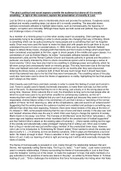Essay
Loot by Joe Orton Essay - “The play’s political and social aspects unsettle the audience but above all it is morally unsettling.” In light of this comment, explore the presentation of morality in Loot.
- Course
- Institution
- Book
This document is an essay for the A-Level text, Loot by Joe Orton. I personally created these revision notes while studying for my A-Levels between . I achieved a grade A* in English Literature, which is reflected in these notes. They are perfect for last minute revision, or if you don’t know whe...
[Show more]




